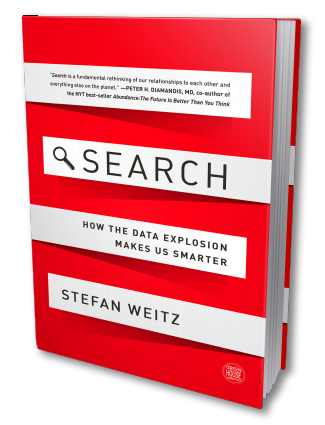Search, book review: The new 'hinge' linking people and machines


Searching is already moving away from you typing in what you want, and getting a list of relevant pages, to systems that do some or all of the work for you. In the future, searching is going to move a long way from typing in a query. Why doesn't travelling to a new place automatically give you relevant information? Is it search if your thermostat looks up sunshine and works out that it should draw the curtains to keep you cool, rather than turning on the air conditioning? What about a Kinect detecting your emotions to see if you really enjoyed a movie, so it can suggest what you might want to watch next time you search for a show? Or your webcam watching how far you read through a web page so the system can calculate if you're likely to remember or forget things?
In Search: How the Data Explosion Makes Us Smarter, Stefan Weitz, director of search at Bing, suggests that search could be the 'hinge' linking us and the technology that describes almost everything around us, and the implications of that are profound. Because if search can cover everything -- indexing and understanding everything in the world, gaining senses like hearing, touching and even smelling as well as seeing everything, and communicating in different way with us and with other systems on our behalf -- then we have a lot of questions to ask about how those systems are designed and what we want them to be able to do. If search is going to connect us to the world, then in some ways it will become our world.
Potential pitfalls
The question is whether that's a good or bad thing, and Weitz notes some of the issues explicitly as he goes along. He devotes several chapters to covering the technical problems, the self-perpetuating business models and the privacy and security issues that could derail his idea of search as an ever-present assistant, gently improving your world without you doing anything more than living your life ("all watched over by machines of loving grace", as the poem puts it). That might be a nudge to order something healthy, drinks that get more expensive the drunker you get, an agent that shows you relevant messages and documents just before a meeting or any other way the system could anticipate your needs.
The economics alone make thoughtful and careful implementations of this future more challenging -- for example, current business models have every incentive to shove ads in our faces because it costs so much to run the system ($3.5 million a month to run just one data centre with only 50,000 servers in, Weitz suggests). There's an interesting section pointing out that we don't own our own data, we give away our public information because we have no idea what it's worth and we have none of the protections of the physical world online.
But Weitz admits that he's a techno-optimist and highlights the potential benefits along with the risks. And along the way, you get a detailed survey of key developments from the beginning of web search -- with one of the clearest explanations of what the graphs that connect information are really about -- to the way all our technologies are starting to matter to search. Images with metadata, video that gets automatically transcribed, identity information from social networks and the signals that clicking 'like' might represent, apps that drive services in the real world like Uber and IFTTT, smart devices and sensors, digital invitations to events, places where you check in, payment systems: Weitz shows you how much of the developed world is already digitized and looks at systems like Wolfram Alpha that pull together that information and turn it into answers. (For a book written by someone who works at Microsoft, there is very little Microsoft-specific technology here, apart from a few fascinating glimpses of experimental systems running at Microsoft Research).
Weitz's optimism shows up again as the book moves from an excellent description of machine learning and the different ways that making people part of search systems could make them more useful, to the potential of artificial intelligence. He's never didactic, but does tend to assume that just because there is an app, service or algorithm to do something 'intelligent' that it does it well. There's one fascinating point here: when people use intelligent assistants like Siri and Cortana, 30-40 percent of the questions aren't real questions -- they're a Turing Test we use to make them prove that they can understand us as (sometimes contradictory and illogical) people, rather than a quest for specific answers.
Reading Search is like sitting next to someone really smart for a couple of hours as they summarize the last 20 years of technology and predict the next two decades. No matter how closely you follow technology you're going to learn something you didn't know, and get some fascinating ideas about where we go next. Whether that excites or terrifies you says more about how you view the world than the book -- Weitz is definitely excited, but he never tries to browbeat you into agreeing with him. That makes Search a great introduction to some of the most interesting questions in technology today, because it doesn't pretend to have all the answers.